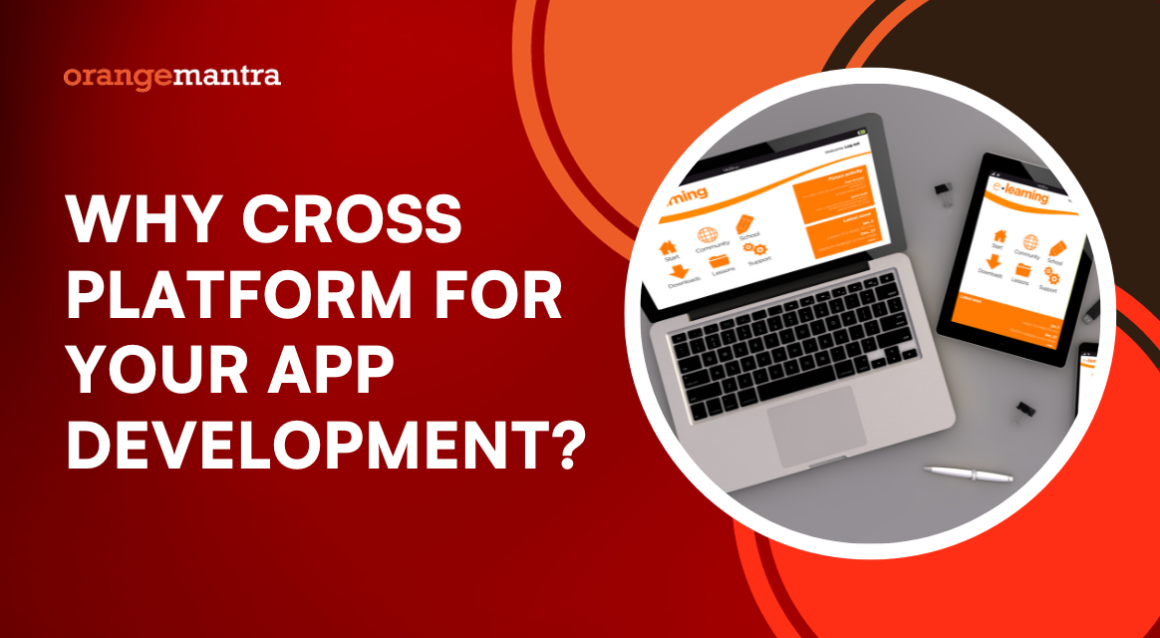Cross-platform app development refers to the process of creating mobile apps that can run on multiple devices, such as iOS, Android, Windows, or macOS, with single codebase. The cross-platform app development services is needed to save time and resources by writing a single codebase that may be used on multiple platforms, instead of developing separate apps for each platform.
Cross-platform app development generally entails the usage of single codebase written in a programming language including JavaScript, C#, or Dart. This code can be shared across exclusive platforms. Cross-platform development is possible with the assistance of frameworks and tools that allow developers to jot down code as soon as possible and set it up to a couple of platforms. Some popular mobile app cross-platform frameworks encompass React Native, Xamarin, Flutter, and Apache Cordova.
The cross-platform apps aim to provide a user experience that is as close to native apps as feasible. They regularly use platform-unique additives and APIs to reap this. Developing a cross-platform app may be more cost-effective and time-efficient in comparison to building separate native apps for every platform due to the fact developers can work one codebase. However, the Mobile app development cost will depend on the type of application you want to build for your business. Cross-platform development lets developers target a wider audience by making their apps available on several platforms.
Now to understand why cross-platform app development is important, it is important to know the differences between cross platform and different other kinds of app development services. The next section of the blog will shed light on the differences between cross-platform vs Native apps, Hybrid apps, and Flutter app development.
Differences Between Native vs. Cross-platform App Development
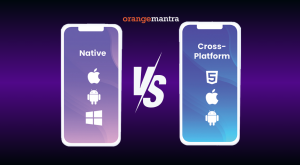
Native app and cross-platform app development is the finest strategy for building mobile apps, every with its own set of advantages and drawbacks.
Native Development
Platform-Specific: Native development includes developing separate applications for every target platform (e.G., iOS and Android). Developers write platform-specific code the use of languages like Swift or Objective-C for iOS and Java or Kotlin for Android.
Performance: Native apps generally tend to provide enhanced performance and responsiveness due to the fact they’ve direct access to platform-precise APIs and hardware.
UI/UX: Native apps can provide the most seamless and platform-precise user experience, as they can leverage the layout and interplay patterns of each operating device.
Access to Features: Native apps have immediate access to all of the brand-new features and competencies of the platform, regularly earlier than they may be available to cross-platform solutions.
Development Time: Developing native apps for more than one structure requires writing and preserving separate codebases, which may be time-consuming and costly.
App Store Presence: Native apps are normally allotted via platform-particular app shops, which includes the Apple App Store and Google Play, that may provide better visibility to users.
Cross-Platform Development
Single Codebase: A Cross-platform app development company in India leverages the developers writing code once and using it throughout a couple of platforms. This code is regularly written in languages like JavaScript (React Native), C# (Xamarin), or Dart (Flutter).
Cost-Efficiency: Cross-platform app development may be more cost-effective and time-consuming as you write and hold a single codebase that can be deployed to multiple structures.
Performance Variability: Cross-platform apps might also revel in barely decreased performance in comparison to native apps, as they often rely on a further layer to translate code to platform-unique features. However, the performance hole has narrowed with upgrades in cross-platform frameworks.
UI/UX: Cross-platform app development offers a native-like user experience, however, there can be some variations in appearance and sense in comparison to absolutely native apps.
Access to Features: Cross-platform development might also have barriers in gaining access to some platform-specific functions, and developers may need to depend on third-party plugins or anticipate framework updates.
Development Community: Cross-platform development has a network, which can be useful for sharing code, and sources, and solving not unusual issues.
App Store Presence: Cross-platform apps can still be distributed through platform-precise app stores, but they’ll face some challenges in phrases of visibility and discoverability in comparison to absolutely native apps.
Differences Between Hybrid vs Cross-platform App Development
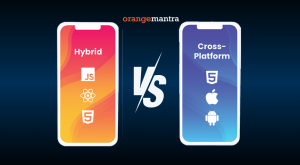
Hybrid app development and cross-platform app development are processes for building mobile applications that share some similarities but have distinct traits.
Hybrid App Development
Web Technologies: Hybrid apps are more often than not built with the usage of internet technologies together with HTML, CSS, and JavaScript.
Wrapper: A hybrid app is largely an internet app wrapped in a native field. It runs inside a WebView, which is a native aspect that could display internet content.
Access to Native Features: Hybrid apps can get access to native tool features and APIs by using plugins or interfaces that bridge the space between the net code and the platform.
Performance: Hybrid apps might also revel in performance obstacles as compared to completely native apps because of the use of WebView and the additional layer for accessing native features.
UI/UX: Achieving a native-like user experience may be tough, as hybrid apps regularly depend on internet technology and may not fully mirror the platform-particular UI factors and interactions.
Offline Capabilities: Hybrid apps can offer offline functionality by way of caching web content material, however, it requires extra effort and expertise.
Development Community: Hybrid app development has a nicely set up community and lots of frameworks like Apache Cordova (PhoneGap) and Ionic.
Cross-Platform App Development
Diverse Languages: Cross-platform apps can be built using several programming languages like JavaScript (React Native), C# (Xamarin), or Dart (Flutter). It’s not limited to web technology.
Native Compilation: Cross-platform apps are generally compiled into native code, that could provide higher performance as compared to natural internet-based totally hybrid apps.
Single Codebase: Cross-platform development also includes a codebase, however, the development technique is more versatile in terms of the choice of the technology.
Access to Native Features: Cross-platform apps have better access to native capabilities and abilities in comparison to pure hybrid apps, as they frequently use platform-precise bindings and modules.
Performance: Cross-platform apps can provide better performance compared to hybrid apps, thanks to the compilation into native code.
UI/UX: Cross-platform apps intended to offer a more native-like consumer experience as compared to hybrid apps, with the capacity to use platform-precise UI elements and interactions.
Offline Capabilities: Cross-platform app development frequently consists of higher help for offline abilities and facts synchronization.
Development Community: Cross-platform app development additionally has a growing and active network, with famous frameworks like React Native and Flutter.
Differences Between Flutter vs Cross-platform App Development
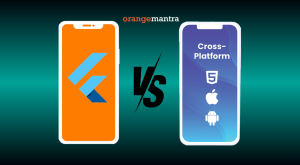
Flutter is a framework for cross-platform app development, so whilst you’re comparing “Flutter” to “cross-platform app development”; you’re essentially evaluating a particular cross-platform way to the idea of cross-platform development in trendy.
Flutter
Framework for Cross-Platform Development: Flutter is a famous open-source framework developed via Google for creating native applications for mobile and web from a single codebase. It is designed in particular for cross-platform development.
Programming Language: Flutter makes use of the programming languages, which are not always as broadly used as languages like JavaScript or C#. However, Dart is relatively easy to examine and has a developing network.
Performance: Flutter is understood for its extremely good overall performance. It compiles code to native code, and the framework is designed to be quite efficient, resulting in the development of easy and responsive apps.
UI Development: Flutter offers a rich set of customizable UI additives and widgets. It makes use of a widget system for developing user interfaces, making it clean to create complicated and custom UI designs.
Access to Native Features: Flutter offers access to platform-precise functions and APIs via platforms. While it gives good native integration, it can now not cover each platform-particular function, requiring custom development for positive use instances.
Community and Ecosystem: Flutter has a growing and active developer community. It gives a range of applications and plugins to extend its abilties, and it’s supported by using Google, which ensures ongoing development and assist.
Hot Reload: Flutter consists of a hot reload; a characteristic that allows developers to immediately see the results of code changes throughout the development process dashing up the debugging and testing procedure.
Cross-Platform App Development
Diversified Frameworks and Technologies: Cross-platform app development company in India offers you various frameworks and technologies like React Native, Xamarin, and others. The desire for a framework relies upon project necessities, developer knowledge, and language preferences.
Programming Languages: Cross-platform development may be accomplished with the use of popular languages like JavaScript (React Native), C# (Xamarin), or Dart (Flutter), among others. The choice of language can impact the development system.
Performance: The performance of cross-platform apps can vary depending on the selected framework. Some cross-platform solutions offer performance close to that of native apps, whilst others may additionally have some overall performance exchange-offs.
UI Development: The ease of UI development and the supply of platform-precise UI factors can vary amongst cross-platform frameworks. Some, like Flutter, offer a quite customizable and consistent UI, whilst others may also depend more on platform-specific layout additives.
Access to Native Features: Access to native capabilities and APIs additionally varies among specific cross-platform frameworks. The level of integration and built-in plugins can have an effect on the range of functions you could leverage.
Community and Ecosystem: Different cross-platform frameworks have their community and ecosystems. The active community can impact the provision of third-party libraries and assist in further processes.
Benefits of Cross-platform App Development for Your Enterprise
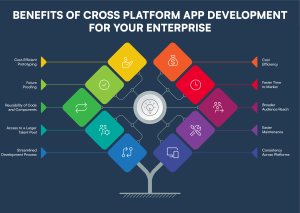
Cross-platform app development may be nice for corporations for numerous reasons, relying on their unique objective and necessities.
Here are some key reasons why an enterprise may pick out cross-platform app development:
- Cost Efficiency: Developing a codebase that may run on multiple structures (which includes iOS, Android, and doubtlessly others) can notably reduce development costs. Instead of maintaining separate groups and codebases for each platform, you could leverage shared code, decreasing development and maintenance costs.
- Faster Time to Market:Cross-platform development allows for quicker mobile app development services. With a codebase, you can launch your app simultaneously on multiple structures, accelerating it slowly to the marketplace and probably getting benefits from that.
- Broader Audience Reach:By concentrating on a couple of platforms with a single app, you may attain a bigger and greater diverse target market. This can be mainly precious for agencies trying to increase their user base and marketplace presence.
- Easier Maintenance:Maintaining a codebase is more efficient than handling more than one codebase for native apps. Updates, trojan horse fixes, and function upgrades can be carried out universally, decreasing preservation efforts and expenses.
- Consistency Across Platforms:Cross-platform frameworks intend to offer a steady consumer revel in and design elements throughout exclusive systems, that can help make stronger your emblem identification and improve consumer pleasure.
- Streamlined Development Process:Cross-platform frameworks often offer equipment and functions like hot-reloading, which make development and testing more efficient. This can result in a faster development process and improved productiveness.
- Access to a Larger Talent Pool:Cross-platform app development often is based on famous programming languages and frameworks, making it simpler to discover and lease developers with relevant competencies. You can tap into a larger talent pool, doubtlessly lowering recruitment demanding situations.
- Reusability of Code and Components:Cross-platform development encourages code reusability, meaning that you can use equal code and additives in numerous parts of your app. This can bring clean, more maintainable code and faster development.
- Future-Proofing: Cross-platform frameworks often update and adapt to new platform features and updates. This can help ensure that your app stays compatible with today’s running machine variations and devices.
- Cost-Efficient Prototyping: Cross-platform app development can be an exceptional preference for unexpectedly prototyping and validating app thoughts before committing to a complete-scale native app development effort.
Some Limitations of Cross-platform App Development
Cross-platform app development gives many blessings, but it additionally has its boundaries and challenges that organizations and developers to be aware of.
- Performance Variability: Cross-platform apps won’t constantly achieve the same level of performance as fully native apps. While performance has advanced with cutting-edge cross-platform frameworks, there can nevertheless be a few performance variability, in particular for resource-in-depth applications or graphics-heavy video games.
- Limited Access to Platform-Specific Features: Cross-platform frameworks aim to provide a common denominator for various systems, but they will no longer support every platform-unique function. Accessing sure hardware components or particular OS skills might require extra work or third-party plugins.
- Plugin Dependency: To get access to platform-specific capabilities, cross-platform developers frequently rely upon plugins or extensions. These plugins might not constantly be up-to-date or well-maintained, doubtlessly leading to compatibility troubles or additional development overhead.
- Overhead and Abstraction: Cross-platform frameworks upload an extra layer of abstraction between the code and the underlying native platform. While this can make development more accessible, it can additionally introduce overhead and complexity.
- Learning Curve: Learning a new cross-platform framework or language can be hard, particularly for developers with know-how in a specific platform. It may additionally take time to end up in new technology while getting into the forum of mobile app development services.
- UI/UX Consistency: Achieving a consistent and fully native-like user experience across platforms can be hard. While cross-platform frameworks offer tools for this, differences in platform layout recommendations and competencies can result in some discrepancies.
- Platform Updates: Cross-platform frameworks won’t straight away guide new platform updates, capabilities, or gadgets. Developers possibly ought to watch for updates or adapt the code themselves, which could lead to delays.
- Debugging and Testing: Debugging and testing tool for cross-platform apps won’t be as mature or complete as the ones to be had for native development, which could gradual down the development process.
- Limited Performance Optimization: Fully optimizing a cross-platform app for every platform may additionally require additional effort and understanding. Achieving the equal level of overall performance as a well-tuned native app may be hard.
Top 3 Cross-platform App Development Solutions
Flutter
- Developed through Google, Flutter is an open-supply UI toolkit for developing Native apps for mobile and from a single codebase.
- It uses the Dart programming language and offers a rich set of customizable UI additives and widgets.
- Known for its tremendous overall performance, hot-reloading feature, and strong community aid.
- Provides get access to huge range of platform-specific functions and is used by companies like Alibaba, Google Ads, and Tencent.
React Native
- Created with the aid of Facebook, React Native is an open-source framework for building mobile apps using JavaScript and React.
- It’s one of the maximum famous cross-platform solutions, recognized for its massive and lively community.
- Provides a native-like experience and access to tool features and APIs through a significant atmosphere of third-celebration libraries.
- Used by companies like Facebook, Instagram, Airbnb, and UberEats.
Xamarin
- Owned by Microsoft, Xamarin is a cross-platform app development framework that lets you to build apps using C# and .NET.
- Xamarin app development services gives a high stage of code reusability, access to platform-particular features, and a sturdy awareness of enterprise and business apps.
- It integrates well with Microsoft’s development tools and services.
- Used by organizations like UPS, Honeywell, and Alaska Airlines.
Concluding Thoughts
The cross-platform app development is evolving rapidly, and there may be new solutions or changes to these frameworks are also visible. Before making a preference, it is crucial to not forget your particular challenge or necessities, developer’s knowledge on this matter. Additionally, the trending updates of cross-platform app development are revolutionizing the app development platform in a drastic manner.
FAQs
What is the best language for cross-platform development?
The top 5 cross-platform programming language are:
- Ruby.
- React Native.
- Flutter.
- Ionic.
- Xamarin.
Is Python good for cross-platform?
Yes, Python is absolutely perfect for cross-platform app development. You can execute almost any Python program on Windows, Mac, Linux hardware, and even Android and iOS.
Is Swift better than Kotlin?
There is no doubt that Swift is much better than how Kotlin performs. Swift allows extensions for additional functionality whereas Kotlin doesn’t allow adding or altering any part of the default feature code.
